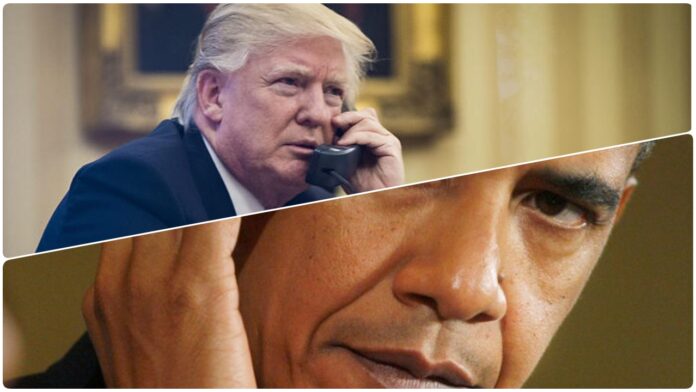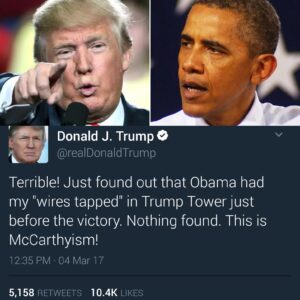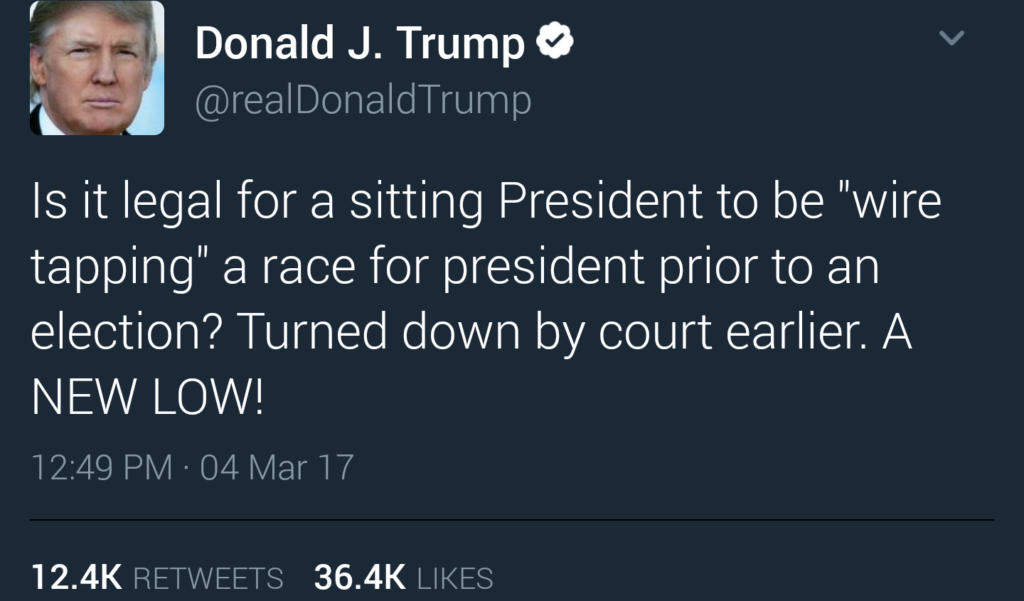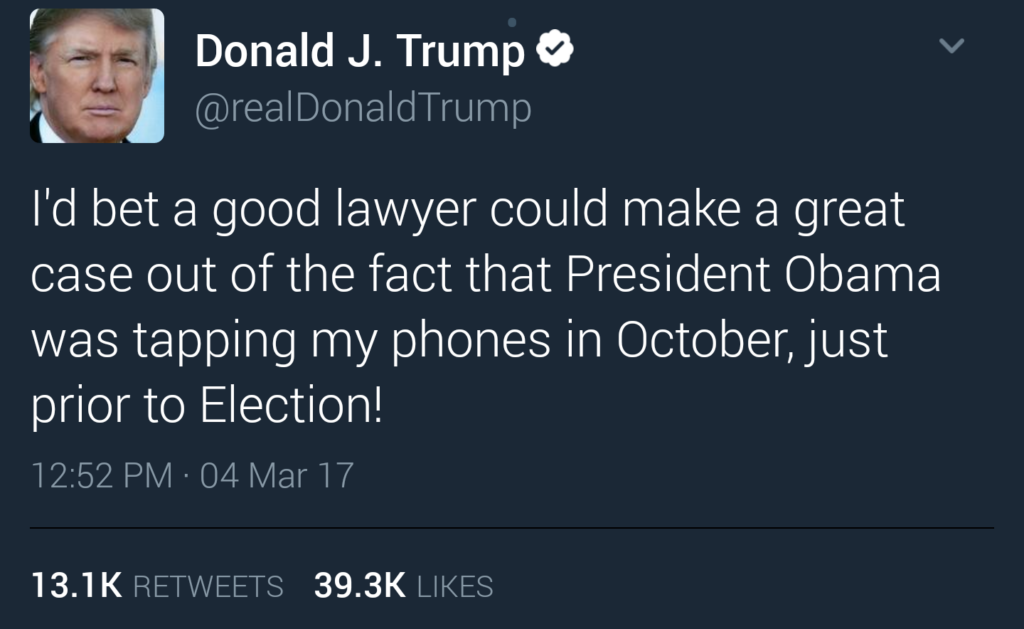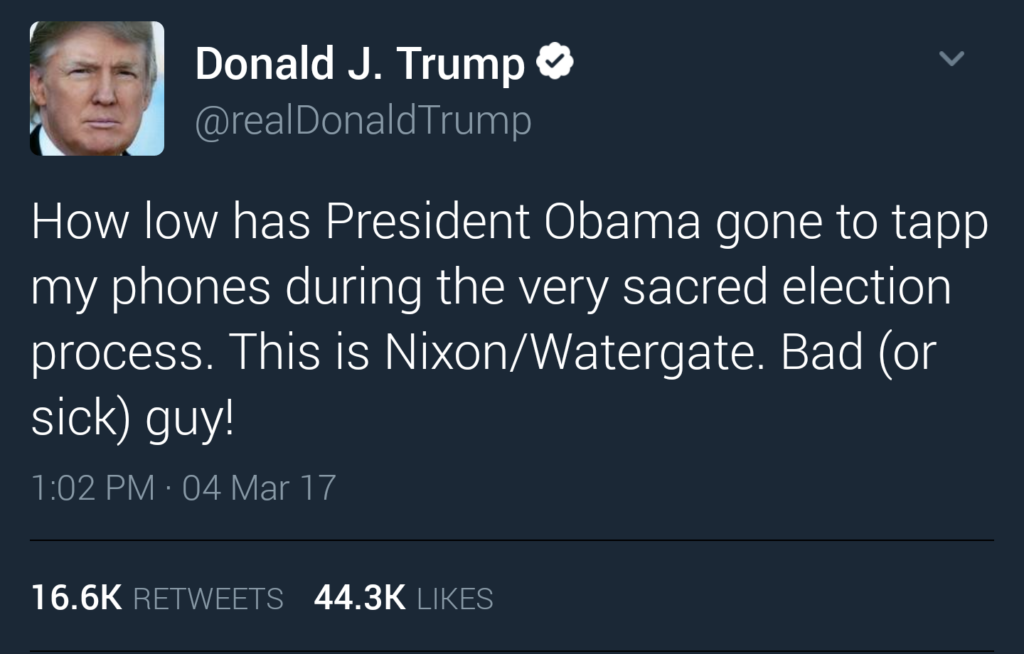Earlier today The president of the United States of America Donald J. Trump twitted on his Twitter account that his predecessor Barack Obama ordered wiretapping of his phones in Trump tower during the US Presidential elections in 2016.
Former administration response
Obama’s former administration did not immediately respond to media request for comment about these accusations.
After some time – Former Deputy and National Security Advisor for Obama Ben Rhodes dismissed Trump’s allegations, saying in a tweet that “no president can order a wiretap.”
Earlier on 3th of March 2017 Radio host Mark Levin spent most of his Thursday evening show discussing the alleged scandal surrounding Attorney General Jeff Sessions and what he says is the real scandal: A “silent coup” by the former Obama administration against President Trump.
“We absolutely know this is true, the FBI did a preliminary criminal investigation based on a potential connection between a server in Trump Tower and a couple of Russian banks. That turned out to be a dry hole, but one of the most outrageous things I’ve ever seen… totally uncovered by the media. Instead of closing the investigation, the Obama administration tried to turn it into a FISA court investigation in June [2016]. Apparently the first application they submitted named Trump.”
Source and read more at: Was Obama Using NSA Against Trump During 2016 Campaign?
Look at this timeline of events that clearly show that something wrong was happening at that time:
Drawing on sources including the New York Times and the Washington Post, Levin described the case against Obama so far, based on what is already publicly known. The following is an expanded version of that case, including events that Levin did not mention specifically but are important to the overall timeline.
1. June 2016: FISA request. The Obama administration files a request with the Foreign Intelligence Surveillance Court (FISA) to monitor communications involving Donald Trump and several advisers. The request, uncharacteristically, is denied.
2. July: Russia joke. Wikileaks releases emails from the Democratic National Committee that show an effort to prevent Sen. Bernie Sanders (I-VT) from winning the presidential nomination. In a press conference, Donald Trump refers to Hillary Clinton’s own missing emails, joking: “Russia, if you’re listening, I hope you’re able to find the 30,000 e-mails that are missing.” That remark becomes the basis for accusations by Clinton and the media that Trump invited further hacking.
3. October: Podesta emails. In October, Wikileaks releases the emails of Clinton campaign chair John Podesta, rolling out batches every day until the election, creating new mini-scandals. The Clinton campaign blames Trump and the Russians.
4. October: FISA request. The Obama administration submits a new, narrow request to the FISA court, now focused on a computer server in Trump Tower suspected of links to Russian banks. No evidence is found — but the wiretaps continue, ostensibly for national security reasons, Andrew McCarthy at National Review later notes. The Obama administration is now monitoring an opposing presidential campaign using the high-tech surveillance powers of the federal intelligence services.
5. January 2017: Buzzfeed/CNN dossier. Buzzfeed releases, and CNN reports, a supposed intelligence “dossier” compiled by a foreign former spy. It purports to show continuous contact between Russia and the Trump campaign, and says that the Russians have compromising information about Trump. None of the allegations can be verified and some are proven false. Several media outlets claim that they had been aware of the dossier for months and that it had been circulating in Washington.
6. January: Obama expands NSA sharing. As Michael Walsh later notes, and as the New York Times reports, the outgoing Obama administration “expanded the power of the National Security Agency to share globally intercepted personal communications with the government’s 16 other intelligence agencies before applying privacy protections.” The new powers, and reduced protections, could make it easier for intelligence on private citizens to be circulated improperly or leaked.
7. January: Times report. The New York Times reports, on the eve of Inauguration Day, that several agencies — the Federal Bureau of Investigation (FBI), the Central Intelligence Agency (CIA), the National Security Agency (NSA) and the Treasury Department are monitoring several associates of the Trump campaign suspected of Russian ties. Other news outlets also report the exisentence of “a multiagency working group to coordinate investigations across the government,” though it is unclear how they found out, since the investigations would have been secret and involved classified information.
8. February: Mike Flynn scandal. Reports emerge that the FBI intercepted a conversation in 2016 between future National Security Adviser Michael Flynn — then a private citizen — and Russian Ambassador Sergey Kislyak. The intercept supposedly was part of routine spying on the ambassador, not monitoring of the Trump campaign. The FBI transcripts reportedly show the two discussing Obama’s newly-imposed sanctions on Russia, though Flynn earlier denied discussing them. Sally Yates, whom Trump would later fire as acting Attorney General for insubordination, is involved in the investigation. In the end, Flynn resigns over having misled Vice President Mike Pence (perhaps inadvertently) about the content of the conversation.
9. February: Times claims extensive Russian contacts. The New York Times cites “four current and former American officials” in reporting that the Trump campaign had “repeated contacts with senior Russian intelligence officials. The Trump campaign denies the claims — and the Times admits that there is “no evidence” of coordination between the campaign and the Russians. The White House and some congressional Republicans begin to raise questions about illegal intelligence leaks.
10. March: the Washington Post targets Jeff Sessions. The Washington Post reports that Attorney General Jeff Sessions had contact twice with the Russian ambassador during the campaign — once at a Heritage Foundation event and once at a meeting in Sessions’s Senate office. The Post suggests that the two meetings contradict Sessions’s testimony at his confirmation hearings that he had no contacts with the Russians, though in context (not presented by the Post) it was clear he meant in his capacity as a campaign surrogate, and that he was responding to claims in the “dossier” of ongoing contacts. The New York Times, in covering the story, adds that the Obama White House “rushed to preserve” intelligence related to alleged Russian links with the Trump campaign. By “preserve” it really means “disseminate”: officials spread evidence throughout other government agencies “to leave a clear trail of intelligence for government investigators” and perhaps the media as well.
In summary: the Obama administration sought, and eventually obtained, authorization to eavesdrop on the Trump campaign; continued monitoring the Trump team even when no evidence of wrongdoing was found; then relaxed the NSA rules to allow evidence to be shared widely within the government…
Source and read more at: Mark Levin to Congress: Investigate Obama’s ‘Silent Coup’ vs. Trump
Was this a silent coup attempt ?! Is this the last drop and the last failed attempt coming from Trump opponents? What will the US government and US justice system do about these shocking revelations?
Best Regards
TBU NEWS

